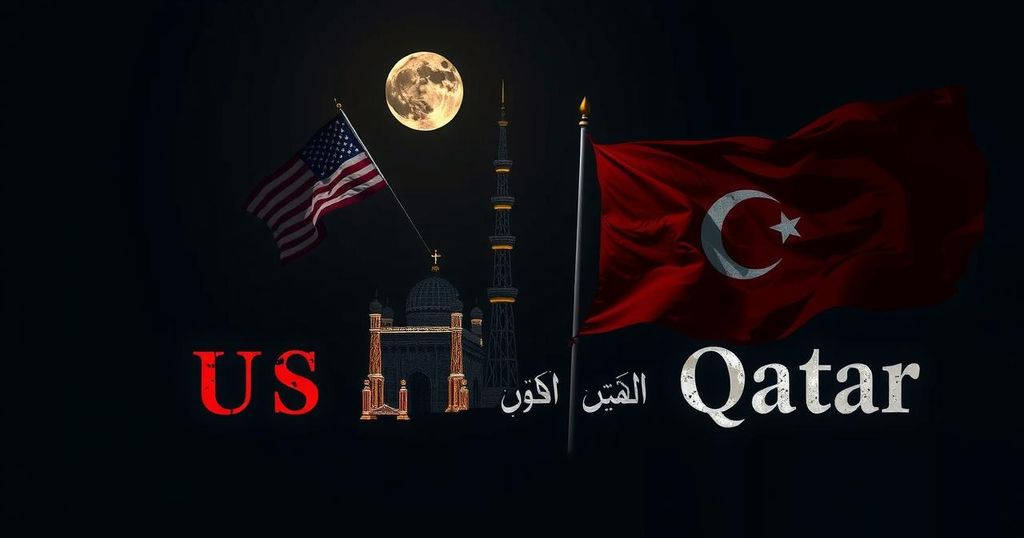Senior U.S. officials have stated that Washington will no longer accept Hamas representatives in Qatar, demanding the closure of their political office. Despite Hamas’ claims to the contrary, the U.S. seeks to negotiate a ceasefire in Gaza, reflecting frustrations with Israeli peace efforts. The potential relocation of Hamas poses security risks for the group; ongoing geopolitical tensions complicate the situation further as the Biden administration tries to influence outcomes before its term ends.
Senior officials from the United States have declared that Washington will no longer tolerate the presence of Hamas representatives in Qatar, attributing this decision to the group’s recent rejection of proposals aimed at securing a ceasefire in Gaza and a hostage agreement. According to sources who spoke under anonymity to Reuters, it was conveyed that the Qatari government had agreed approximately ten days prior to instruct Hamas to shutter its political office in Doha. Since 2012, Hamas has maintained a political base in Qatar, a move initially facilitated by the Obama administration to allow for communication with the organization. However, officials from Hamas have denied these claims in statements to the BBC, and thus far, the Qatari government has remained silent on the issue. Qatar is a pivotal ally of the United States in the Middle East, hosting a significant American air base and playing a central role in various negotiations with entities such as Iran, the Taliban, and Russia. The Qatari leadership, alongside the United States and Egypt, has been involved in initiatives aimed at negotiating a ceasefire in the ongoing conflict between Israel and Hamas, which has spanned over a year. Recent talks in mid-October proved fruitless, as Hamas turned down a proposal for a temporary ceasefire, consistently advocating instead for a complete cessation of hostilities and the withdrawal of Israeli forces from Gaza. Concurrently, Israel stands accused of spurning peace negotiations as well. Yoav Gallant, the former Israeli Defense Minister, publicly criticized Prime Minister Benjamin Netanyahu for dismissing a peace agreement contrary to the counsel of his security advisors. Expert Dr. H.A. Hellyer, from the Royal United Services Institute (RUSI), expressed confidence in the accuracy of the reports regarding Hamas’ potential expulsion from Qatar. He indicated, “I think we’re in the last phase before Hamas is forced to relocate.” The Biden administration’s apparent urgency to facilitate a peace accord before its term concludes in January is underscored by its call for Hamas to vacate Doha. The prospective relocation of Hamas raises questions, primarily regarding potential alternatives such as Iran or Turkey, the latter being a NATO member and historically a more secure base for the group. Hamas’ leadership now faces dire safety concerns, highlighted by the killing of two of its leaders in recent months, including Ismail Haniyeh in Tehran and Yahya Sinwar in Gaza. In response to this precarious environment, Hamas has established a temporary leadership model to reduce the impact of assassination attempts. According to Dr. Hellyer, relocating from Doha, where U.S. military presence offers some level of protection, would significantly heighten the risk faced by the organization, which is at odds with Israeli interests. Simultaneously, U.S. officials are growing increasingly frustrated with Israel’s handling of the conflict. In October, top American officials warned Israel of potential diplomatic repercussions if they did not permit greater humanitarian aid into Gaza. Recent reports from UN officials characterize conditions in northern Gaza as “apocalyptic,” asserting that famine is imminent in the area. The relationship between President Joe Biden and Prime Minister Netanyahu has grown increasingly strained. With Trump’s anticipated return to the presidential office, which may herald a more Israel-favorable policy environment, U.S. influence within the Israeli government is expected to wane. Consequently, applying pressure on Hamas appears to be a strategy the current administration may consider to spur a negotiation process, albeit uncertain given Qatar’s historical alignment with the group.
The article discusses a significant development regarding U.S. foreign policy towards Hamas, particularly in relation to their presence in Qatar. It highlights the implications of the U.S.’s stance amidst ongoing conflicts between Israel and Hamas in Gaza, and the broader geopolitical relationships involving the U.S., Qatar, and regional dynamics, especially in light of changes in leadership both in the U.S. and Israel.
In summary, the U.S. administration’s refusal to accept Hamas’ presence in Qatar signals a potentially pivotal shift in Middle Eastern geopolitics as the Biden administration seeks to expeditiously negotiate a ceasefire before the end of its term. The implications of this move extend beyond Hamas and Qatar, affecting U.S.-Israel relations and regional stability as the current conflict continues to evolve. The future of Hamas’ political operations remains uncertain, reliant on both their leadership’s safety and shifting alliances in the region.
Original Source: www.bbc.com






